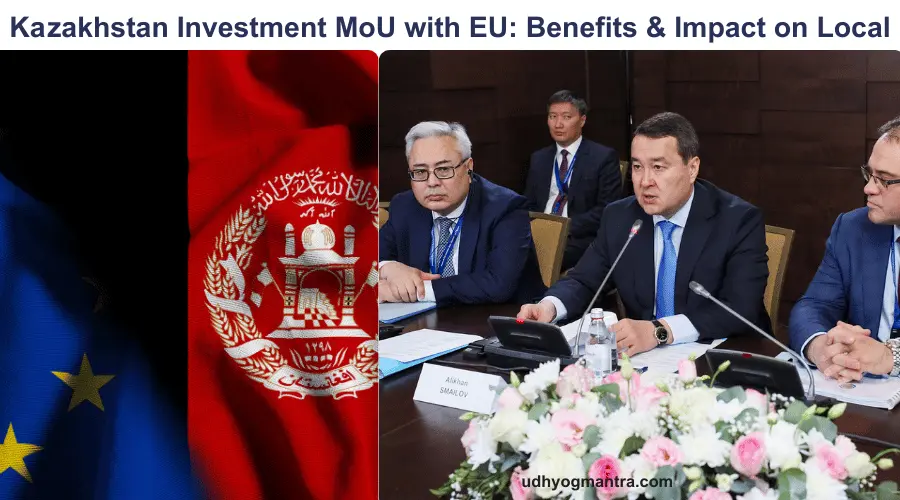On an equally important occasion, the European Union (EU) and Kazakhstan signed a memorandum of understanding. It is for establishing strategic cooperation in sustainable raw materials replenishment, battery manufacturing, and renewable hydrogen development on November 07, 2022. This “Kazakhstan investment MoU” is exclusive of any legal confusion. It has brought considerable excitement in the private and public sector investment interest, particularly in the CRMs. It is necessary to analyze what value addition it has brought to Kazakhstan. Also, how much has it changed the way of life of the people at the local level?
Strategic Benefits for Kazakhstan in 2024
1. Economic Growth and Diversification
The most notable advantage that the Kazakhstan investment MoU has for Kazakhstan is economic development. The agreement has provisions for enhancing foreign direct investments (FDI) from active partners. Such as the member states of the European Union into the mining and processing of CrM activities. By 2023 Kazakhstani investments by the EU had reached $7.8 billion. It has reduced slightly compared to the previous year but still shows their interest towards the economy of Kazakhstan. Investment from European countries such as Germany and France is increasing especially in lithium exploration and processing. We all know Lithium is a major ingredient in the making of batteries and electric vehicles.
These investments promote the economic structure of the country, steering it towards sectors other than oil and gas, which have been a mainstay in Kazakhstan. By expanding its mining and green energy implementation Kazakhstan has settled its place in the global green economy. This kind of diversification promoted by the Kazakhstan investment MoU is essential in maintaining economic sustainability. And, also safeguarding against the adverse effects of oil price volatility.
2. Infrastructure Development
The partnership under the Kazakhstan investment MoU with the EU is also envisaged to lead to notable infrastructural developments in the Republic of Kazakhstan. The European Investment Bank (EIB) is reported to have signed MoUs for co-financing transport initiatives as part of the Global Gateway which aims at improving logistics of movement of raw materials to Europe.
Better infrastructures would not only ease the trade flows but also enhance local growth by improving the connection and logistics network. This infrastructure development is significant for Kazakhstan’s ambition of establishing itself as a central link regionally for the mining and processing of critical raw materials.
3. Enhanced Global Standing and Reduced Dependence on China
The Kazakhstan investment MoU with the EU is one way through which Kazakhstan is enhancing its global standing while at the same time eliminating its dependency on conventional associates such as China and Russia.
It enables Kazakhstan to strengthen its ties and obligations towards the EU, whose interest is to wean itself off the Chinese supply of essential raw materials and instead access them from this other fabrication market player. Such a re-orientation can enable Kazakhstan to achieve a fairer and more rounded trade position thereby eliminating dependence on specific markets without compromising any aspect of the trade activities.
Impact on Local Communities due to Kazakhstan Investment MoU
1. Creation of Job Opportunities and Improvement of Skills
The development of the Kazakhstan investment MoU towards the increase in foreign direct investment in mining and renewable energy projects is expected to employ substantial personnel in local communities. The new mining, lithium, and battery plants will require a broad range of skills from geology and engineering to construction and administration. This particular employment opportunity enhancement is significant in the regions within Kazakhstan which were hitherto poor or predominantly agricultural and relied on subsistence or extraction industries.
The establishment of policies that promote high environmental, social, and governance (ESG) practices by European investors also enhances the training and development of a competent labor force. Because of such training programs and partnerships with European companies local employees will be trained in advanced mining techniques, social responsibility, and renewable energy technologies thus enhancing the country’s human capital requirements.
2. Improved Living Standards
According to the Kazakhstan Investment Memorandum of Understanding, it is anticipated that there will be increased foreign direct investments and economic diversification. Surely, it uplift the living standards of the indigenous populations in the areas of investments. However, with the emergence of new industries and well-paying jobs, there is the likelihood of enhanced income per household, service access, and community health and well-being. In addition, however, European investments in road construction, energy, and communication technology, among others, will also improve the social welfare of the local communities.
3. Environmental Impact and Sustainable Development
In as much as the activities involved in mining are often accompanied by negative effects, such as environmental damage, an investment agreement between the Kazakhstan side and the EU through the Kazakhstan investment MoU opens up chances for the advancement of cleaning up activities in Kazakhstan’s mining sector. By targeting investments in sustainable development, the EU is likely to push for minimum adverse governance standards that will assist in protecting the local environment. Such a culture of environmental protection is encouraged in Kazakhstan which seeks to foster development while minimizing carbon emissions.
4. Enhanced Local Governance and Transparency
The prevalence of high environmental, social, and governance (ESG) standards in the Kazakhstan investment MoU enhances local governance structures. European-based industries have a culture of transparency and corporate responsibility. This will also encourage Kazakhstani ones to do this too. This could lead to increased transparency, less corruption, and enhanced management of natural resources. Kazakhstan’s investment MoU gives local people a more equitable distribution of wealth and resources.
5. Tasks and Issues
While the Kazakhstan investment MoU has more pros in terms of its benefits. There are challenges and considerations for it too. The MoU is non-binding, which means its success mainly depends on the commitment and strategies of the two parties to the agreement.
For instance, Kazakhstan should remain committed to the ongoing efforts to attract European capital by focusing on a stable investment climate. Also, developing legislative codes, and facilitating cooperation with the EU. On the other hand, more effort should be made on the internal transparency of the MoU. Specifically, making available roadmaps and decisions of the working groups to create confidence of the investors to attract more investment.
The government of Kazakhstan calls for consideration of key aspects affecting its development. Firstly, the Memorandum of Understanding which is made in line with its Agenda 2030 and regional integration programs. Stimulating factors like the growth of investments in many sectors of the economy are paving the way toward effective development. It also helps in the recognition of Kazakhstan’s position on the world map. Social equity, job expansion, infrastructure improvement, and better local governance are the various advantages to the local people. After all, the strategic partnership should be comprehensive and it should not only promote the interests of investors and states but also the people.
Conclusion
The MoU for investment purposes between the EU and Kazakhstan has opened an avenue for Kazakhstan. It enhances to reap economic benefits, attain sustainable growth, and improve the quality of life within its territories. Kazakhstan’s position as a trustworthy participant in the green economy value chain is also becoming more prominent. For the citizens, the outcomes are evident; jobs, skills, better infrastructure, and better governance. Both the EU and Kazakhstan on the other hand should not lose sight of the agreement. It is properly utilized in favor of all parties concerned not only the investors and states but also the host populations.


